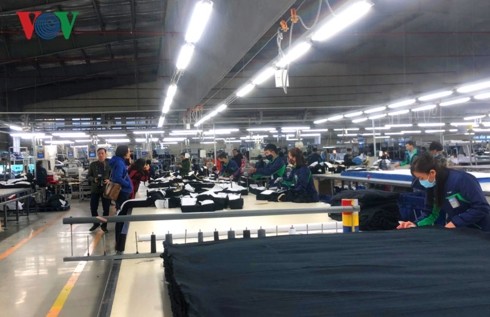(VOVWORLD) - Many domestic and foreign experts have forecast the Vietnamese economy will continue to grow 7% this year thanks to drastic development of the manufacturing, processing, and service sectors.

In 2019 Vietnam’s economy will likely continue to grow 7%.
|
Vietnam’s economy grew and inflation contained at less than 3.6% last year. Major balances of the economy were steady; the balance of payment was high; and public debt and budget balance were under control.
Economist Le Xuan Nghia said: “Last year Vietnam’s GDP achieved a 10-year high growth rate which is expected to continue this year. The growth was attributed to the increase of consumption and exports which was far above the set target. Domestic enterprises reported a higher export growth than that of foreign companies. Vietnam gained a high record of 40 billion dollars from agricultural, forestry, and aquatic exports.”
Vietnam's improved investment environment and the Government’s efforts to further cut licenses will create a momentum to achieve GDP growth of 7% this year.
According to Hoang Cong Tuan, Head of Economic Research of the MBS Securities Company, since 2012 the Party and State have focused on improving the business environment and restructuring the economy rather than achieving short-term GDP growth.
Tuan noted that policies to promote the private sector development and renovate the growth model have proved effective.
“This year, we remain optimistic about the Party and state’s directions and policies on boosting the Vietnamese economy. We expect the rebound of the private economic sector this year and the years to come will make Vietnam’s economy more efficient and sustainable,” Tuan explained.
Economists urged the Government to continue to reform institutions and the business environment in order to increase private investment. The economic restructuring must be strengthened and growth models changed to take advantage of the opportunities brought about by international developments and positive prospects of new-generation trade agreements such as the Comprehensive Partnership Agreement and Trans-Pacific Progress (CPTPP) and Vietnam-EU Free Trade Agreement (EVFTA). Economists also underscored the importance of adjusting and strictly controlling public service prices to contain inflation below 4%.
Truong Van Phuoc, acting Chairman of the National Financial Supervisory Committee, said processing and services remain the main factors of Vietnam’s economy.
Phuoc noted: “We hope Vietnam’s GDP will grow 7% and inflation is kept below 4% based on evaluating the world and domestic economic situations. Though the world economy remains unstable due to the ongoing trade war, there are still outstanding opportunities. The domestic economy is supported by policies to boost the private economic sector, reforms in the growth model, and improvements in the business environment.”
Although economists are optimistic about the Vietnamese economic growth of 7% this year, they say Vietnam will still face difficulties caused by the overall challenges of the world economy. Thus it requires the Government to be flexible in making macroeconomic policies and more efforts of enterprises.